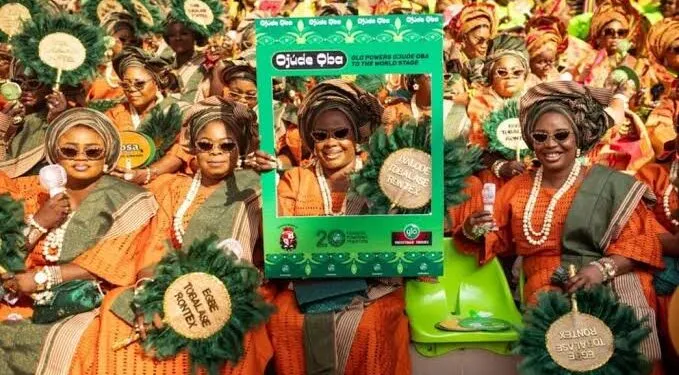The Ojude Oba Festival remains one of Nigeria’s most captivating cultural celebrations, drawing thousands of guests and participants each year to the historic town of Ijebu Ode in Ogun State.
The annual festival is a colourful demonstration of the Ijebu people’s commitment to preserving their deep-rooted customs, honouring their monarch, and celebrating their unique identity.
Held each year on the third day after Eid-el-Kabir, the Ojude Oba Festival serves as a cultural conclusion to the Muslim celebration and continues to evolve in both significance and spectacle.

What began in the 19th century as a small gathering of Muslim adherents paying homage to the Awujale—the traditional ruler of Ijebuland—has transformed into a national and global spectacle that blends tradition with modern elegance.
The festival, which translates to “The King’s Court,” has grown in scope and attendance, becoming an annual pilgrimage for lovers of Yoruba culture and tradition. Over the years, the leadership of Oba Sikiru Adetona, the Awujale of Ijebuland, has helped nurture the festival into its present form—one that celebrates not only religion but also community, unity, and heritage.

Each edition of Ojude Oba is held at the Awujale Pavilion, where attendees are treated to a breathtaking visual experience. From elegantly dressed men and women in traditional Yoruba attire like Adire, Aso Oke, Agbada, and Iro and Buba, to parades and horse riding displays by the revered Balogun families, the festival is a rich tapestry of class, culture, and creativity.
Age-grade groups, known as Regbe Regbe, including Gbobaniyi, Bobagbimo, Gbobalaye, and Obafuwali, participate in spirited competitions. These parades feature not only coordinated attire and choreography but also serve as an avenue for the display of unity, honour, and deep respect for the Awujale. They present him with prayers, gifts, and performances in a tradition that stretches back generations.

While these group displays are cultural in nature, they have also become competitive showcases, with corporate sponsors offering prizes and recognition to outstanding performances.
Prominent horse riders from respected Balogun families like Balogun Adenuga, Balogun Alatise, Balogun Adesoye, Balogun Alausa, and Balogun Kuku thrill the audience with bold entrances and coordinated outfits. These processions have become iconic features of Ojude Oba, captivating both local and international attendees with their pageantry and ancestral pride.

Despite the global setback caused by the COVID-19 pandemic, which led to the suspension of the festival in 2020 and 2021, Ojude Oba has bounced back with renewed energy. The 2024 edition, held on June 18, showcases a revitalised expression of cultural pride and unity, even as members of groups like Egbe Jagunmolu Obirinrin parade before the Awujale to honour his leadership.
Beyond the cultural elements, Ojude Oba also has a significant impact on the local economy. With a surge in hospitality demand, hotels and guesthouses are typically fully booked, while vendors, artisans, and service providers benefit from the influx of tourists.

The festival also presents a golden opportunity for corporate brands to establish a presence, as roads and public spaces around the event are filled with banners, logos, and sponsored installations.
Given its increasing national and international relevance, the Ojude Oba Festival is also heavily secured. Authorities ensure the deployment of security personnel across various agencies to safeguard lives and property throughout the celebration.
As the 2025 edition unfolds, it stands as a powerful tribute to the Ijebu people’s heritage, leadership, and enduring cultural pride. The sense of community, competitive spirit, and artistic expression combine to offer participants and visitors a deeper appreciation of Yoruba culture, seen through the vibrant lens of Ijebuland.






What you should know
Ojude Oba is a traditional festival celebrated by the Ijebu people in Ogun State, Nigeria, held annually three days after Eid-el-Kabir.
What began as a small gathering of Muslims paying homage to their king has evolved into a major cultural and economic event, known for its colourful displays of Yoruba fashion, age-grade parades, horse riding, and homage to the Awujale of Ijebuland.












